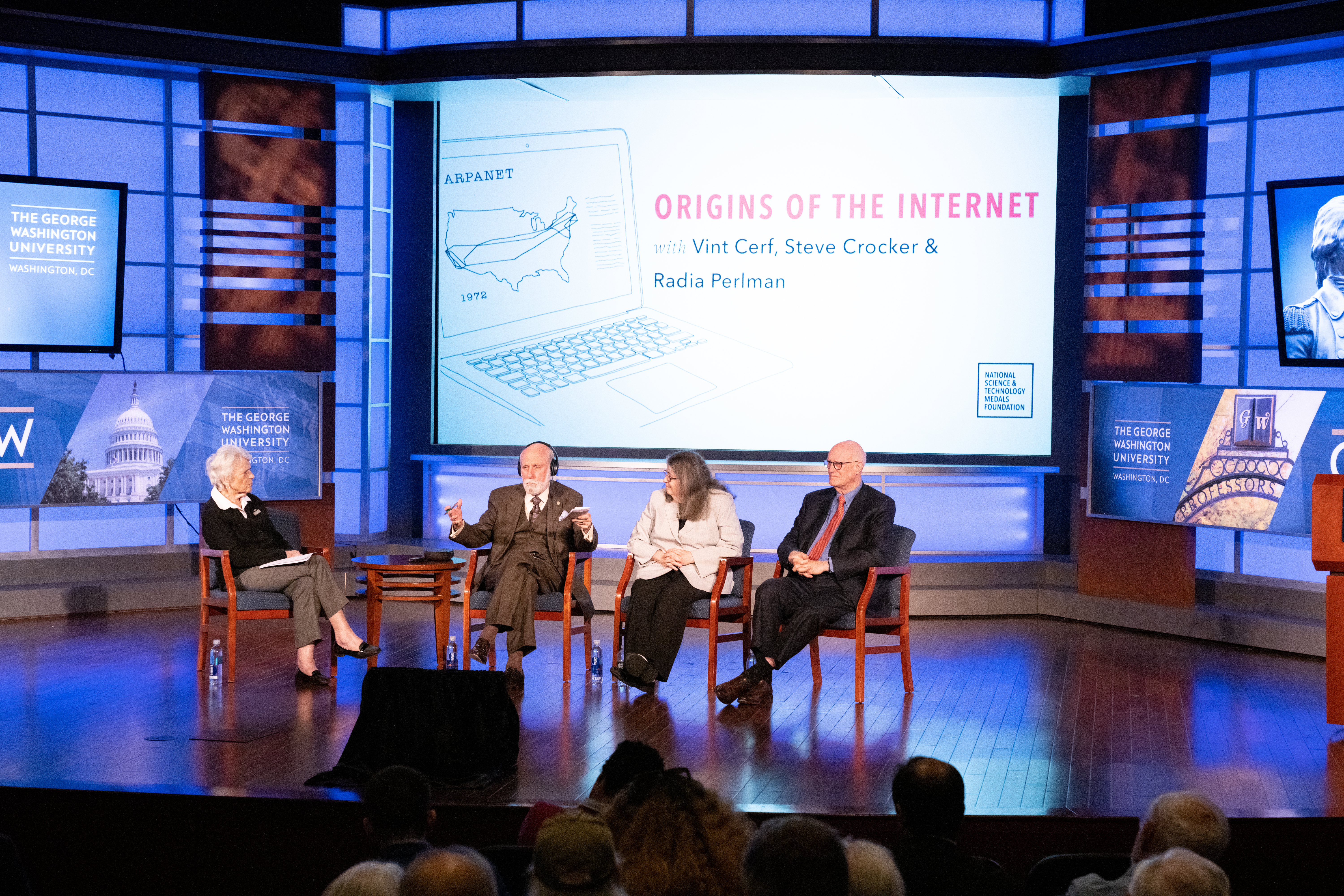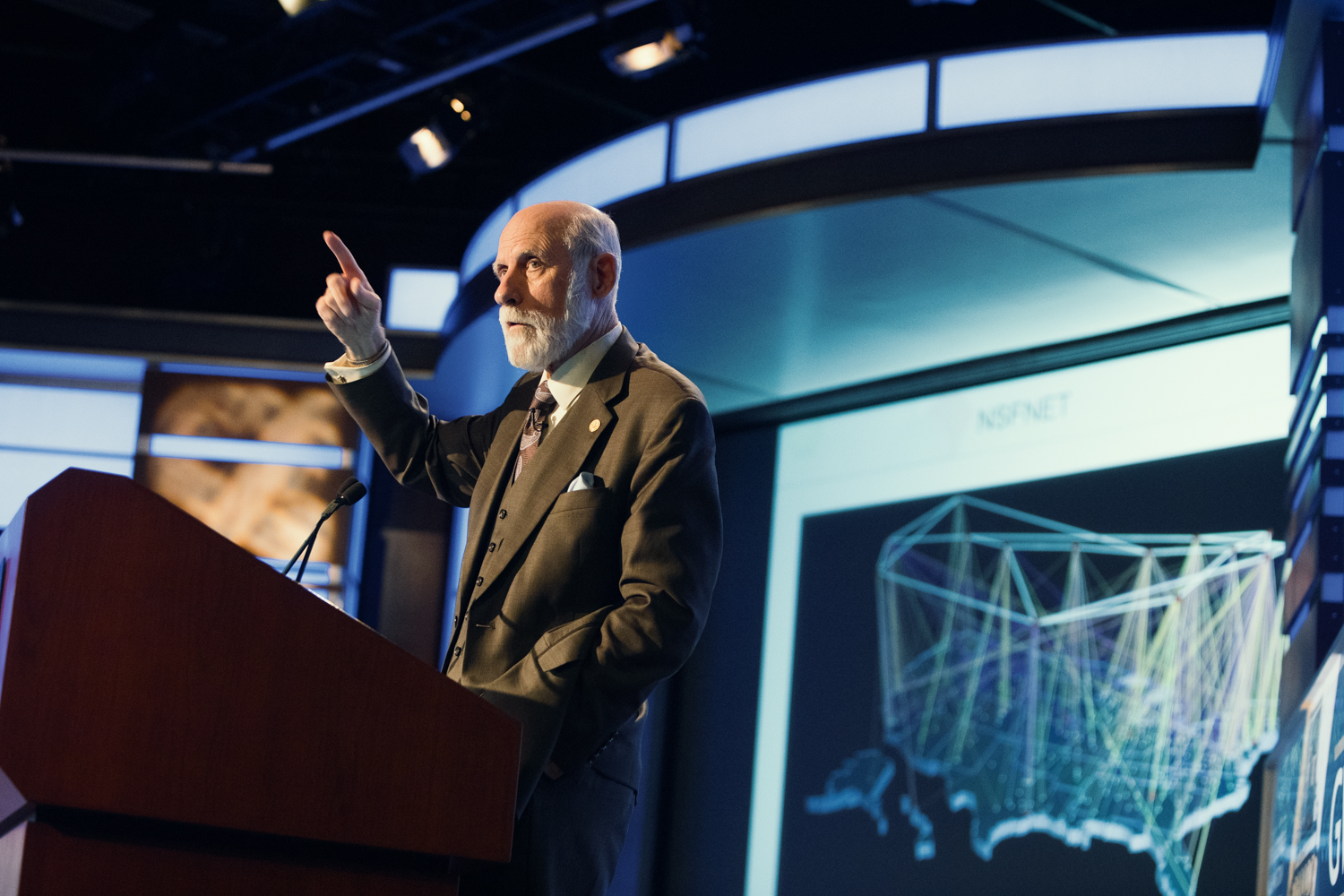By Kristen Mitchell
The creation of the internet revolutionized the modern world, making it easy to connect with far-away loved ones and purchase items without having to visit a physical store. Some changes, however, have made life more challenging.
Radia Perlman, a computer programmer and network engineer, told a crowd at Jack Morton Auditorium on Thursday that the internet has also brought on the “end of truth.” Today, anyone can spread false information from a smart phone in a matter of seconds. As a result, she said, many people don’t distinguish between credible and not-credible sources.
“The internet is great, it had a great run, but it’s the end of civilization,” she said.
Dr. Perlman spoke at GW as part of an event titled “Science Unscripted: Origins of the Internet.” The event featured a panel discussion with Dr. Perlman, Vint Cerf and Steve Crocker, who are all credited as creators and architects of the internet. They spoke about why the internet grew the way it has, the effects of commercialization and the tensions arising today from pervasive use.
The event was sponsored by the National Science and Technology Medals Foundation. It was held in partnership with the GW chapter of the Association for Computing Machinery (ACM).
John Lach, dean of the School of Engineering and Applied Science, said it was exciting to welcome legends in the computing field to GW and noted their significant contributions to technology and communications that shape today’s world. GW was a fitting setting for this discussion because George Washington was known as a great innovator of his time, Dr. Lach said.
“Now here in the 21st century, this wonderful university that bears the name of George Washington is continuing to impact society in a variety of really important ways,” he said.
Dr. Cerf, who spoke about computing earlier this year at GW, said being on the internet today requires users to think critically about the information they are consuming.
“The price you have to pay for access to this open system is the work you have to put into it to distinguish quality information from poor quality information,” he said.
The major concern lies with individuals who cannot discern between the two, Dr. Perlman said. More needs to be done to make systems secure and usable for all audiences and to transform the internet into “the wonderful thing that it has the potential of being,” she said.
Dr. Crocker said he remains hopeful that society will adjust to the rapid technological changes that have occurred over the past 50 years. He believes the world will find the right balance between regulation and the openness that is “essential to the kind of society and democracy we want to live in.”
Because network systems are so closely intertwined with human behavior, it’s important that the field of computer science is inclusive to social science disciplines such as economics, psychology and sociology, Dr. Crocker said. A better understanding of human behavior would allow engineers to design systems that accommodate varying behaviors.
Dr. Crocker said he started to understand this issue better once he started FaceTiming with his young grandchildren.
“They take great delight in going up to the phone, they know that they are communicating, and pressing the button that is most obvious to press—the big red button with a big X,” he said. “That’s the end of the conversation.”
The tantalizing lure of a large, forbidden button is a classic example of user interface misdesign, Dr. Crocker said.

Vint Cerf (left), Radia Perlman, Steve Crocker, Rachelle Heller and Dean of SEAS John Lach at “Science Unscripted: Origins of the Internet.” (Photo: Jay Premack, USPTO)
Members of the audience had the opportunity to ask questions following the panel discussion, which was moderated by SEAS professor Rachelle Heller. A GW student asked the panelists if they believed tech companies such as Apple and Google would continue to cooperate with censorship from China and other governments.
Dr. Cerf said declining to do business in China poses a challenge for companies. The country represents a significant market with many potential users.
“You can’t just shut your eyes to that,” he said.
The other panelists agreed and said one tech company or society should not be charged with deciding what other governments and cultures do. Societal differences have developed over centuries. The evolution of the internet, which transcends national boundaries, has shed light on some of the nuanced differences.
“I don’t think that you would really want to be able to enforce particular philosophies across all societies,” Dr. Crocker said. “The results of that might be even worse than what we see now.”




